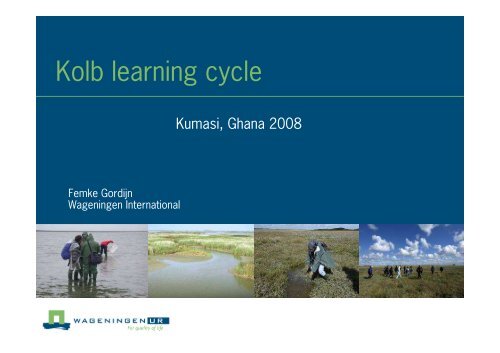Kolb learning cycle - Wageningen UR
Kolb learning cycle - Wageningen UR
Kolb learning cycle - Wageningen UR
Create successful ePaper yourself
Turn your PDF publications into a flip-book with our unique Google optimized e-Paper software.
<strong>Kolb</strong> <strong>learning</strong> <strong>cycle</strong><br />
Femke Gordijn<br />
<strong>Wageningen</strong> International<br />
Kumasi, Ghana 2008
<strong>Kolb</strong>’s 4 types of experiential <strong>learning</strong><br />
<strong>learning</strong> from concrete experiences<br />
<strong>learning</strong> from reflective observation<br />
<strong>learning</strong> from abstract conceptualisation<br />
<strong>learning</strong> from active experimentation
The Experiential Learning Cycle<br />
Concrete<br />
World<br />
Active<br />
experimentation/<br />
testing out (pragmatist)<br />
Abstract<br />
World<br />
4<br />
Concrete experience (activist)<br />
1<br />
Act Act<br />
Decide Decide<br />
Explore Explore<br />
Analyse Analyse<br />
Reflective<br />
Observation<br />
(reflector)<br />
2<br />
3<br />
Abstract conceptualisation / making sense (theorist)
Annual ‘project <strong>learning</strong> <strong>cycle</strong>’<br />
Concrete<br />
World<br />
Concrete changes<br />
to the plan<br />
Abstract<br />
World<br />
Activities and their results during the year<br />
1<br />
4<br />
Act Act<br />
Decide Decide<br />
Explore Explore<br />
Analyse Analyse<br />
The annual<br />
review<br />
2<br />
3<br />
New ideas or revised theories about the project
The Action Learning Cycle<br />
Evaluate<br />
Plan<br />
Monitor<br />
Act<br />
Evaluate<br />
Plan<br />
Monitor<br />
Act
<strong>Kolb</strong>’s model:LEARNING<br />
Application<br />
Experience<br />
Conceptualisation<br />
Reflection
How can this be<br />
applied in a new<br />
situation?<br />
Which firsts steps<br />
could you take?<br />
Application<br />
Can you relate it with previous<br />
experiences?<br />
What does this mean for the<br />
project?<br />
LEARNING<br />
Experience<br />
Conceptualisation<br />
The concrete<br />
experience evoked as a<br />
result of the activity<br />
Reflection<br />
What happened? Why?<br />
How did you feel?<br />
What did you see others<br />
doing?
Critical reflection for experiential <strong>learning</strong><br />
1. What & why<br />
2. So what<br />
3. Now what<br />
What has succeeded or<br />
failed? Why have we had<br />
success or failure?<br />
So what are the implications<br />
for the project?<br />
What action will we now take<br />
to make improvements?
1. Reflection questions<br />
What happened?<br />
What surprised you?<br />
What did the person do/say?<br />
Whom was having a conflict?<br />
What went well?<br />
What did not go well?<br />
Why?
2. Conceptualising questions<br />
So what does this tell you?<br />
So what can you learn from that situation?<br />
So what are the implications of this process?
3. Planning/application questions<br />
Now what would you do in such situation?<br />
Now what are you going to do differently?<br />
Now what does this mean for you/your work?<br />
How would you apply your lesson learned?
What kind of<br />
experience do<br />
we talk about?<br />
Experimenting<br />
How to ensure<br />
that it is<br />
translated into<br />
action?<br />
LEARNING<br />
Experience<br />
Conceptualization<br />
© The Sparkle<br />
– from an exercise<br />
or from real life?<br />
- Is it relevant?<br />
Reflection
Domain of production<br />
Experimenting<br />
LEARNING<br />
Experience<br />
Conceptualisation<br />
Reflection<br />
Domain of reflection
EXPERIENTIAL LEARNING<br />
The game-circle vs. the real-life circle<br />
• Do we want participants to be better at<br />
participating in exercises?<br />
• Or to act differently in the real life?<br />
© The Sparkle
Thank you<br />
© <strong>Wageningen</strong> <strong>UR</strong>
Assignment 4 Groups<br />
1. Experience – arm wrestling game<br />
2. Facilitate the reflection phase<br />
3. Facilitate the conceptualisation/generalisation<br />
phase<br />
4. Facilitate the planning and application phase
Assignment group 1<br />
“Win as many points as you can. You score a point<br />
every time you get the other persons hand touch the<br />
table. You have 60 sec. for that.”
















![CynefinFramework final [Read-Only]](https://img.yumpu.com/19017304/1/190x135/cynefinframework-final-read-only.jpg?quality=85)